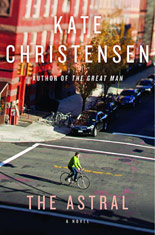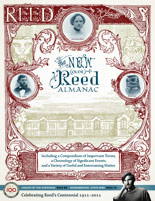
IRIS login | Reed College home Volume 90, No. 4: December 2011
Reediana
Kate Christensen ’86
The Astral (Doubleday, 2011)
By Audrey Van Buskirk

Kate Christensen has a way with men. In earlier novels, she’s created a string of memorable male protagonists, such as Hugo Whittier, the washed-up writer who is chain-smoking his way to the grave in The Epicure’s Lament, and Oscar Feldman, the philandering painter whose death lies at the crux of The Great Man, which won the 2008 PEN/Faulkner award.
In The Astral, her sixth novel, she’s sculpted the life of Harry Quick, 57, a mildly successful poet whose cosseted life is upended when his long-simmering wife Luz tosses him out. She believes, falsely, that she’s discovered irrefutable evidence of an affair by sneaking a look at Harry’s latest work, which she destroys by literally tearing it to shreds, then tosses his computer out of the window, along with all the routines and comforts of his life.
Flattened by his loss, Harry manages to gather up his shattered fragments and patches himself together into a whole, if wholly different, person. Christensen deftly pokes at the glue, smoke, and mirrors that hold a marriage together through vivid flashbacks of Harry’s life with Luz, as well as vignettes with Harry’s still (unhappily) married friends and a hilarious scene in which Harry descends upon his wife’s therapist and viciously castigates her for ruining his marriage.
The Astral has many funny moments, often involving Harry’s warm yet distant relationship with his daughter Katrina, a do-gooding lesbian freegan, and son Hector, a starry-eyed follower who’s either in the clutches of a cult or the charlatan behind it. By the novel’s end, it is clear that Kate understands the secret of compelling books and enduring romance—leave them wanting more.


LATEST COMMENTS
steve-jobs-1976 I knew Steve Jobs when he was on the second floor of Quincy. (Fall...
Utnapishtim - 2 weeks ago
Prof. Mason Drukman [political science 1964–70] This is gold, pure gold. God bless, Prof. Drukman.
puredog - 1 month ago
virginia-davis-1965 Such a good friend & compatriot in the day of Satyricon...
czarchasm - 4 months ago
John Peara Baba 1990 John died of a broken heart from losing his mom and then his...
kodachrome - 7 months ago
Carol Sawyer 1962 Who wrote this obit? I'm writing something about Carol Sawyer...
MsLaurie Pepper - 8 months ago
William W. Wissman MAT 1969 ...and THREE sisters. Sabra, the oldest, Mary, the middle, and...
riclf - 10 months ago